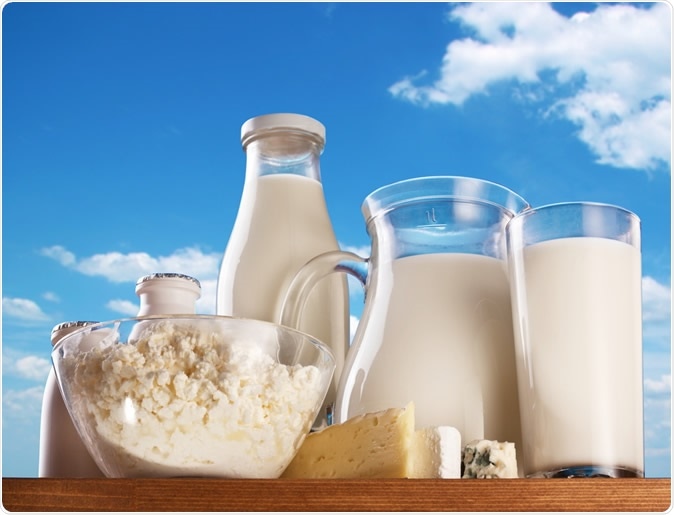According to a new study from researchers at the Loma Linda University Health, drinking milk regularly might be linked to breast cancer in women. The new study titled "Dairy, soy, and risk of breast cancer: those confounded milks," was published in the latest issue of the International Journal of Epidemiology today.

Dairy, soy, and risk of breast cancer: those confounded milks. Image Credit: Valentyn Volkov / Shutterstock
Main findings
The researchers noted that daily consumption of milk could raise the risk of breast cancer in women by up to 80 percent. The risk depends on the amount of milk consumed they wrote. Lead researchers on this study Gary E. Fraser explained that this study is "strong evidence that either dairy milk or some other factor closely related to drinking dairy milk is a cause of breast cancer in women." He added, "Consuming as little as 1/4 to 1/3 cup of dairy milk per day was associated with an increased risk of breast cancer of 30%. By drinking up to one cup per day, the associated risk went up to 50%, and for those drinking two to three cups per day, the risk increased further to 70% to 80%." Fraser said that at present the United States dietary guidelines say that an individual needs three cups of milk per day. He added, "Evidence from this study suggests that people should view that recommendation with caution."
The study
The team wrote that there had been studies that link the risk of breast cancer with an intake of soy milk and soy products as well as dairy products. However, studies on this are inconsistent, and no firm conclusions could be drawn. To assess this, they looked at a very large population of women and assessed the actual risk posed by these products.
For this study, they included 52,795 North American women. At the start of the study, they did not have cancer. The population contained 29.7 percent of African American origin. They were all provided with food questionnaires (FFQ or food frequency questionnaires) where they needed to record the frequency of different food consumptions. For 1,011 participants, 24-hour recall of foods taken was also recorded. For all women at baseline, questions were asked on family history of breast cancers, physical activity, hormonal and other medication use, alcohol consumption, history of gynecological and obstetric events and diseases and frequency of breast cancer screening.
Over the follow up of an average of around eight years, the new cases of breast cancer among these women were registered, and the association of these food items and the cancer incidence was analyzed using "multivariable proportional hazards regression."
Results
From the study, the team found that there were 1,057 new cases of breast cancers among the population studied. The participants were of an average of 57.1 years. No association between soy products and breast cancers was found. The hazard ratio of breast cancers from soy milk consumption was 0.68, they wrote.
This was independent of dairy food consumption. With a rise in dairy product consumption, the risk of breast cancers rose (Hazard ratio of 1.22). Similar results were seen with both full fat and reduced-fat milk, the team wrote. Cheese and yogurt consumption did not show a similar association with breast cancers, they found. The associations held true for both pre and postmenopausal women.
Takeaways from the research
Fraser explained, "...dairy foods, especially milk, were associated with increased risk, and the data predicted a marked reduction in risk associated with substituting soymilk for dairy milk. This raises the possibility that dairy-alternate milk may be an optimal choice."
The team also said that there had been recent studies reported by the Adventist Health Study-2 (AHS-2) saying that vegans are at a lower risk of breast cancers compared to non-vegetarians as well as those who are lacto-ovo-vegetarians (vegetarians consuming milk and eggs). This new study is part of the AHS-2 study.
Fraser said that the causative factor behind this association could be the sex hormone levels in dairy milk. He said that the cows are lactating, and three-quarters of them are pregnant at the time of milking. This means that the sex hormone levels in the milk are higher. Since breast cancers in women are responsive to sex hormones, the risk seems to be more significant. There is also a greater level of hormone, insulin-like growth factor-1 (IGF-1), in the women taking animal proteins, and this could raise the risk of breast cancers, the team speculated. Fraser said, "Dairy milk does have some positive nutritional qualities, but these need to be balanced against other possible, less helpful effects. This work suggests the urgent need for further research."
Journal reference:
Gary E Fraser, Karen Jaceldo-Siegl, Michael Orlich, Andrew Mashchak, Rawiwan Sirirat, Synnove Knutsen, Dairy, soy, and risk of breast cancer: those confounded milks, International Journal of Epidemiology, , dyaa007, https://doi.org/10.1093/ije/dyaa007